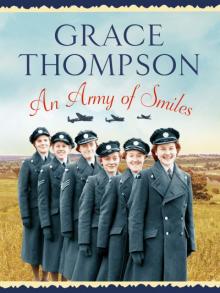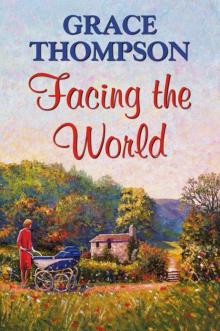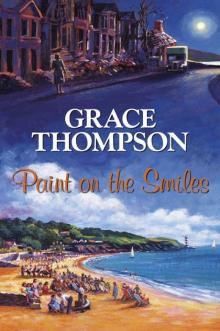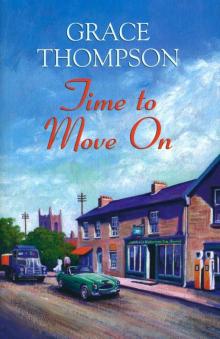- Home
- Grace Thompson
The Runaway Page 4
The Runaway Read online
Page 4
On the following day Faith went to Dinas Powys and sat on the wall of the churchyard where a wedding was taking place. She was lost amid the crowd of well-wishers, who were waiting for the appearance of the bride and groom. It seemed the whole village was gathered to enjoy the occasion. The sun shone, warming the ancient stones on which she sat and adding a rosy glow to the scene. But Faith’s eyes showed none of the joy of those around her and she wasn’t part of the group. Standing lonely and ignored by the rest, she sank into melancholy.
This was how she had always imagined her own wedding day, but Matt had spoilt that by forcing her into a sexual relationship for which she had not been ready, then finding out she was expecting a child. Her dreams of a love match, culminating in a white wedding with friends surrounding them and everyone in the village wishing her well, were gone. The temptation to move away, somewhere where Matt couldn’t find her, had been strong. But being on her own for most of her life had left its mark and she was afraid of returning to those lonely years. Matt and his mother, a family of sorts, had been too much to give up, even though she feared for a different kind of loneliness in the years ahead.
If only she could run away as she had done in the past. When she learned she was pregnant, it had seemed as though the last door to freedom had slammed and she was trapped. Winnie was a friend whom she would miss, but she’d have coped if it weren’t for the baby. A baby was a strong tie between herself and Matt, ‘And’, she repeated like a mantra. ‘running away is no longer possible.’
She glanced at her watch. It was time she went back. It would take two bus-rides and a walk, she’d be very late and Carol would be ringing Matt and telling him she was missing. After any absence of longer than half an hour Carol worried. Coming back to the place where she had been brought up by foster-parents had taken Faith most of the morning.
She wasn’t sure why she had come; hope of perhaps seeing a friendly face and maybe make contact with the neighbours she had once known. A pretence that someone might remember her, and care. So far she had seen no one she recognized. After so many years the place had changed. The house where she had lived with her foster-parents had new tenants. When she went to look, a young woman with two small children skipping around her had been washing the front step. She looked happy and the children were chubby and rosy.
The crowd began to murmur and move towards the church door and Faith eased her awkward body away from the wall and moved with them. She might as well see the couple and add her hope that they had chosen wisely and that a happy future beckoned to them. She smiled grimly. The only choice she had been able to make was to refuse to marry Matt, not to give in to his persuasive arguments or his mother’s emotional pleading. She had to have his child but at least she didn’t have his name. It was a small victory but a victory nevertheless.
To shouts of admiration the newlyweds stood at the doorway and awaited the instructions of the photographer. The remarks changed to more ribald comments and laughter filled the air around her but Faith felt as though she were behind a screen, looking out but unseen, the sounds distant and nothing to do with her. There were tears in her eyes, blinding her to the people as she pushed her way toward the lich-gate. She hurried back to the bus stop for the first stage of the journey back to the house she was supposed to call home.
Carol was looking anxiously out of the window and she opened the door as Faith approached. ‘Faith! I wondered where you were. You’ve been gone this ages.’ The soft Welsh lilt didn’t manage to hide the disapproval in Carol’s voice.
‘I can hardly get lost, can I? I went on the bus to Dinas Powys, and stopped to watch a wedding.’
‘Why? This is your home now.’
‘They were called Jennifer Rees and Julian Brown. Lovely couple,’ she said, having overheard.
‘And you and our Matt will be following them up the aisle soon, won’t you?’
‘I don’t think so.’ Avoiding further reprimands about bringing a child into the world without making Matt its legal father, Faith pulled herself up the stairs to the only privacy she had, her bedroom, at least until Matt came in. The privacy of her own room hadn’t lasted even a day.
Christmas came and went and the days dragged by. She felt so lethargic, forcing herself to do the small, boring jobs which were all Carol allowed her to do. Surely pregnancy should be a joyful time, she thought sadly. Shouldn’t she be busy preparing for her child? Even her attempts at knitting and sewing were taken over by Carol. She felt stifled by the exaggerated care she was given. She felt like a prisoner and the days were long, the weeks stretched out before her with the promise of even more frustration and boredom as she imagined Carol insisting on taking over the care of the baby when it arrived.
As Matt worked so close to the house he could appear at any time, calling in between the stages of his work. And she became jumpy, startled when he opened the door and called to her as though afraid she had moved; waiting between times made her very tense.
Matt was talented and his work was admired, even by those who couldn’t hide their dislike of the man. He made everything from the smallest gnome to the most impressive statues, plant-stands, benches, fences and garden furniture. He worked in several materials, including stone, his favourite, and wood. The inexpensive animals were made from moulded cement, and many of his items were skilfully painted. If life were different she would have been filled with admiration for his ability but, as with everything else, she was too wearied by boredom to take a real interest.
Although she visited the yard on occasions, usually when he had made something with which he was particularly pleased, she found the rest of his life a mystery. He was ten years older than Faith, and about his past she knew nothing. Yet he must have had a past. Not all of it pleasant, if the woman in the café was to be believed. One last attempt to persuade his mother to talk about it failed like the rest, and Faith noticed a frisson of fear cross Carol’s face each time she asked a question even though they were questions she thought innocuous. Curiosity didn’t fade because of this attitude, it increased.
One cold, bright day in early February, a shout from outside woke her from an afternoon rest and she looked out of the window to see Matt lying under a fallen ladder. His stillness was terrifying and she seemed to stay without moving for an age, but in fact it was only seconds before she rose from the bed and ran out to him. It was obvious from the position of his leg that it was broken. She ran to the phone and called an ambulance, which was arriving as Carol returned from the shops.
The ambulance men came, diagnosed a broken leg and took him to hospital. Carol went with him and Faith, having been told to stay at home, followed by bus. As soon as she arrived she was told to go back home. ‘You mustn’t risk the baby,’ Matt warned and his mother agreed. Nearly at the end of her pregnancy she knew they were talking sense and besides, Carol wanted to stay and there was no need for them both to be there. She caught a bus instead of the taxi which Matt advised and made a cup of tea which she took to her room. In less than fifteen minutes she was asleep.
Carol woke her when she returned and they made lists of the people who needed to know. People expecting finished orders, mainly. ‘What about relations?’ Faith asked. ‘There must be some who would like to visit?’
‘Oh, we needn’t worry about anyone else. It’s only you he’ll want to see, and me of course.’
‘We could get some of his clothes washed while he’s in hospital; you know how difficult it is to persuade him to part with his favourites. And his suit and overcoat could go to the cleaners while we’re at it. Perhaps I could take some of his clothes to the cleaners tomorrow?’
‘Don’t worry yourself dear. We can sort all that once he’s home.’
The following day Carol went to the hospital on her own. Matt having insisted that Faith needed her rest. Faith had been given his clothes to bring home, so she picked up his coat and began to empty the pockets ready to take it to the cleaners. Her fingers found a bank statement and she was
about to put it with the rest of the contents when she realized it was not Matt’s usual bank. Curious, she opened it. What she read was puzzling. It was in Matt’s name but it was nothing like their normal account. Money went into this separate account at intervals, each transaction different, the dates and amounts varying each month, but payments were precisely and regularly made to an Ethel Holland on the twenty-eighth day of each month.
She stared at the pages for a long time, then, when she heard a car pulling up outside she looked out of the window to see Carol stepping out of a taxi. She stuffed the papers into her pocket and went down to open the door to her.
‘I’ve put his clothes ready for the cleaners,’ she said brightly.
‘Give them to me,’ Carol said. ‘Heavens, girl, haven’t you got the kettle on yet? Dozy, you are. More go in a damp firework, as my mam used to say.’
When they sat drinking their tea, Faith asked quietly, ‘Who is Ethel Holland?’
Carol turned to stare at her. ‘Who? Never heard the name. Where did you get it from? Gossiping in the newsagent’s again, I’ll bet.’
‘Matt was muttering in his sleep the other night and said something that sounded like Ethel Holland.’
‘Forget it, and don’t bother Matt with dreams, he’s ill, remember.’
Faith nodded vaguely but thought the newsagent’s was a good place to ask questions. Sounding as though she knew more than she actually did would be a good way to begin.
The newsagent’s was quiet when she went in later that day. She paid the weekly bill and casually asked, ‘Matt told me about the trouble he was in a few years back. D’you think he was innocent? He insists he was wrongly accused.’
The man stared at her uneasily. ‘Told you, did he? There’s a surprise. I don’t want to discuss it, Faith. Loses his temper too quick, that one. Best you ask him what you want to know.’
‘How long ago was it, Mr Foster. Five years? Six?’
He frowned for a moment then said. ‘More like ten. It was in June, I remember, a hot, sunny day, and – Oh, Hello, Mrs Cooper!’ He looked relieved. ‘Called for your Radio Times have you?’ He shook his head at Faith, dismissing the subject and smiled as he turned to the other customer. Faith went out and she was smiling too. If the newspapers had reported whatever had happened, the library was the place to begin.
She went to see Matt, taking the few things he needed, and was told he would be home in a few days’ time. ‘Your mother has made up a bed for you near the fire so you won’t have to struggle up stairs,’ she explained.
‘That won’t do, tell her to put it away. I’m going upstairs as usual,’ he replied.
‘But won’t it be difficult for you?’
‘We share a bed, you and I, and that’s how it will always be.’
Leaving him before the rest of the visitors departed she went into town. At the library she asked for the local newspapers, for 1949. She wasn’t sure where to start, but she had at least an hour before Carol expected her home.
She was too uncomfortable to sit and turn the large pages in their heavy folders, so she stood, glancing down each page in the hope of her eye catching a headline that was relevant. The January to June papers were almost finished when she saw, not a headline but a photograph of Matt Hewitt. The name that jumped out of the pages, beside his, was Ethel Holland.
The story beneath the photograph of the man she lived with made her feel sick, she was afraid she would faint. The print shimmered in front of her eyes, making it difficult to read, but taking deep breaths and forcing herself to be strong, she read it right through, as well as the follow-up, in the July to December issues. Then she sat, pale-faced and distraught, staring unseeing across the hushed room.
Aware of her distress, the librarian came up and led her to the toilets where she allowed her body to make its protests in violent nausea.
She was taken into the staffroom and encouraged to sip a cup of hot tea. It was twenty minutes before she felt well enough to go home. On the librarian’s advice, she took a taxi, although she wished she could walk. After what she had read, she was in no hurry to see either Matt or his mother.
Ignoring Carol’s demands to know where she had been, longing for peace to think about what she had learned, believing Matt was still in hospital, she went to the bedroom.
Seeing Matt lying on the bed, smiling at her, she screamed and ran back out.
She had to prepare. Ignoring Carol’s demand for an explanation she repacked her suitcase ready for the hospital, adding her bank book and a few small personal items and locked it. Then she went to see Winnie but refused to explain the reason for her distress.
Under the pretence of seeing doctors and the midwife and keeping appointments at the hospital she saw a solicitor, doctors, social workers and child-care officers. She was constantly tearful but Carol believed it was the emotion of the forthcoming birth and was even more caring.
The labour pains began suddenly one morning when she was visiting Winnie and were intense. Without going back to collect her ready-packed suitcase, she went to the hospital with clothes borrowed from Winnie and what money she had in her purse. Winnie promised to collect her ready-packed suitcase for her and take it to the hospital within the hour.
The birth was painful, mainly because she was in such a distressed state. Sympathy from the kindly nurses changed to firmness in the hope that they would shock her out of her misery, but when her child was born later that night Faith turned away from her, and made it clear she would not be feeding the child.
The nurses were concerned. She had been attempting to delay the birth, trying to prevent the baby from being born, and now there was this complete rejection. Although they coaxed in every way they could, Faith was unwilling even to get a glimpse of her daughter.
She gritted her teeth when Matt came stumping in to see her and leaned over to kiss her. ‘Soon have you back where you belong,’ he whispered. ‘They don’t keep you in for long these days, and I need you back home.’
She feigned exhaustion and turned away. He pushed her gently and talked to her but she didn’t move. The knowledge of what she had to do was shutting out every other thought. Her mind was made up, but her body craved to hold the child. She couldn’t sleep. Cries were heard during the night and she wondered whether her baby was calling for her. Several times she almost relented and began to call the nurse but she couldn’t change her mind. What she was doing was for the best for the baby.
After speaking again to the social workers and child-care workers and solicitor over the following day, forcing herself to appear calm, she signed the necessary papers. Her heart raced with misery and despair but her signatures were strong. She had to do what was right.
At the end of the second-day stay, Winnie came with fresh clothes and a few things Faith had asked for. Faith hardly said a word. Over the past week she’d had long, exhausting and difficult discussions with doctors and the relevant legal representatives and requested that her daughter be named Dorothy. She now lay exhausted, in an agony of misery but knowing she had done the right thing. The baby was not with her when Matt and Carol visited and she explained that she was in the night nursery as she had a slight infection and they weren’t allowed to see her for a few days.
As the visitors shuffled out, Faith hastily dressed in the toilets and, unnoticed, went out with them, leaving her baby behind. Her daughter must never know her father.
Matt’s fury frightened Carol when they went to the hospital and were told that Faith had walked out leaving no forwarding address. She warned him he would make himself ill if he didn’t calm down.
‘Calm down? She’s gone, left me and my baby! How can I stay calm, you stupid woman. Where is she? You must know. She must have planned it and given a clue where she was going.’
‘Something upset her, I know that, but she didn’t discuss anything with me. The room is ready for her, I’d put the cot beside your bed, everything new and perfect.’ Carol sobbed quietly. ‘I was so looking forw
ard to having a baby to love and care for.’
Matt put on his coat.
‘Where are you going? You should be resting your leg,’ Carol said.
‘Winnie James. She must know. Close friends they are, those two. Probably planned it together.’
Winnie was clearly surprised and alarmed when he told her Faith had disappeared and even in his anxiety and anger he could see her shock was genuine. She asked more questions than he and when he left they both promised to inform the other when they had news of Faith. Although Winnie knew it was a promise she wouldn’t keep.
Winnie received a letter from Faith the following day, posted in Dinas Powys, but it was very brief, an apology for not telling her what she had planned, and promising to tell her the reason one day. Winnie didn’t show it to Matt. Until her friend explained her actions she would avoid telling Matt anything that might help him find her.
Matt searched everywhere. He asked the neighbours, teachers and pupils at the school, the shops, people in the park. Wherever he asked, people promised to let him know if they learned something, although many – like Winnie – quickly decided they would not. There had to be a good reason for Faith to walk away from the baby and without telling anyone. Winnie thought of the remarks made by the woman in the café and wondered if Faith had learned something that had upset her. She didn’t mention this to Matt. She would say nothing until she had spoken to her friend. Surely she would get in touch with her?
When Carol and Matt went to the hospital to arrange for the baby to come home, there was worse news than the disappearance of Faith. She had registered the baby but not in Matt’s name. The authorities had been told the child was the result of a previous relationship and was nothing to do with him.
There were more enquiries, both at the hospital and at the police station, but to no avail. Confidentiality had been assured, specially when the authorities checked on Matt’s background.

 Nothing is Forever
Nothing is Forever Friends and Secrets
Friends and Secrets An Army of Smiles
An Army of Smiles Sophie Street
Sophie Street Gull Island
Gull Island Facing the World
Facing the World The End of a Journey
The End of a Journey Unlocking the Past
Unlocking the Past Goodbye to Dreams
Goodbye to Dreams The Weston Girls
The Weston Girls Paint on the Smiles
Paint on the Smiles Time to Move On
Time to Move On The Runaway
The Runaway